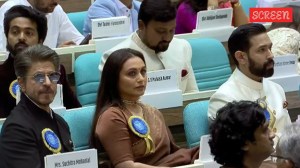Click here to follow Screen Digital on YouTube and stay updated with the latest from the world of cinema.
Guest Column: Songs of Substance
Thought-provoking, soulful songs made a mark this year.
Vidya Shah
The intense and solemn O Husna plays in the car, a hit song by singer-songwriter Piyush Mishra, and I see my 16-year-old has it by heart as he sings along. Set in a love story between an Indian boy and his Pakistani love, the song is a commentary on the loss, futility and sadness that the Partition has meant to a lot of people in India and Pakistan. I ask him casually if he knows what the song is about, and the stern look I get in return suggests that of course, he does.
Music and lyrics have always been powerful vehicles to provoke people into thinking about the need for change.
Dylan fans were also his fans because of the political narrative in several of his songs; Joan Baez put off record labels for choosing to be a ‘peacenik’; while Miriam Makeba sang for the freedom struggle in South Africa when she was exiled. Closer home, Iqbal Bano was banned from public singing in Pakistan for singing Faiz’s Hum dekhenge. These are just a handful of examples of how musicians have fused into the social and political fabric of the times they lived in. And this is a trend that continues even today; most recently, we had Bono sing for Paris.
Whenever there has been a collective response against society, music has played the role of a catalyst. In the early 20th-century India, the Progressive Writers Association breathed life into cultural production. There was also the Indian People’s Theatre Association, which worked towards an avant-garde culture in India through theatre and then prolifically through cinema.
A large number of the country’s cultural intelligentsia came together to produce work that was in line with their idea of social justice. For instance, Sahir Ludhianvi — who, in later years, had to write ‘popular’ songs for want of work such as Gapuchi-gapuchi gum-gum for Trishul in 1975 — was also the one who wrote Wo subah kabhi to aayegi, or the powerful rhetoric in the poem Taj Mahal. While the likes of Sahir, Josh, Kaifi and Majrooh are remembered largely as film lyricists, their anger about equality and justice that resonated against the anti-colonial struggle are an important part of our cultural history.
But the success of O Husna, the qawwali Bhar do jholi in Bajrangi Bhaijaan, Jugni by Arif Lohar, or Kailash Kher “remixing” Pt. Kumar Gandharva’s iconic Kabir-Naiharwa highlight that powerful lyrics combined with cerebral music can influence young minds. The only caveat here is that often audiences are unaware of the context these songs carry.
Perhaps like Sahir had a beautiful dream with Aao ke koi khwaab bunein, kal ke waaste, we too can dream of our young celebrating the coming together of Jhoole lal and Mast qalandar when they ‘groove ‘ to the ‘rocking’ Dama dam mast qalandar!


Photos
- 01
- 02
- 03
- 04
- 05































